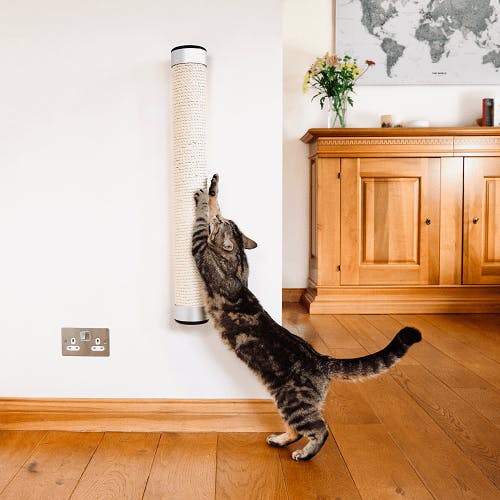Contrary to their reputation of being aloof, cats can actually be wonderfully loving companions! Have you recently welcomed a feline friend to your home, or are you considering becoming a cat parent for the first time? While it’s true that cats generally require less attention and care than dogs, there are still some basics and tips you should know. First-time cat parents, we’ve put together a guide for your kitty’s needs as well as pointers to keep them safe and happy in their new furever home!
Let’s start with the necessities
- Food: Many cat parents choose to feed their kitties a combination of dry and canned food. It’s generally agreed that a high-protein diet is better for feline health, so choose a cat food that has good quality protein as its main ingredients.
- Water: Cats are notoriously picky, especially about their drinking water! This means that many cats don’t get enough liquids, which inevitably will lead to urinary tract problems and a whole host of other medical issues later on. Try upping their water intake by feeding them more wet food or consider purchasing a water fountain – the running water makes drinking more appealing. Also, place their water bowl in a different area from their food bowl, as cats tend not to drink close to their food source.
- Toilet: There are a lot of litter options to choose from. Start with the kind your kitty is already used to, and you can gradually train them to use another brand or type later. Cats love cleanliness, so make it a habit to empty out the litterbox at least once a day.
Going to the vet
- Vaccination: Vaccines help protect our furry friends from potentially deadly viruses. It’s important to be up to date on your new furry friend’s vaccination records, especially if they are a kitten. It’s generally recommended for cats to get a series of shots before they are 16 weeks old. Discuss with your vet about which vaccines your kitty needs and when to administer them.
- Neutering/spaying: It may seem cruel to prevent an animal from reproducing, but most animal welfare groups advocate this procedure to reduce the number of unwanted furry friends. Neutering (for males) and spaying (for females) are routine operations and can be done safely on kittens starting from as early as 8 weeks old.
- Have a 24/7 vet: As most pet kitties are kept indoors, it may seem that the chances of them getting into accidents are few and far between. However, accidents can also happen at home (read on for cat-proofing tips) and indoor cats are still vulnerable to common feline illnesses. Be prepared for medical emergencies by having the info of one or two vet clinics that offer 24-hour emergency service. Read about common health problems for cats here.
Keep them active
Cats may spend a large chunk of the day napping (up to 20 hours out of a 24-hour day!), they also love to play. Kittens, especially, may surprise you with how much energy they have. Keep your furry friend active with a variety of toys around the house. Doesn’t have to be anything fancy – they love boxes and bags of all shapes and sizes, or even just a string will do!
Buying a scratching post or two is also a wise investment for first-time cat parents. It will give them an outlet to use their claws, so they won’t scratch away at your leather couch or carpet!

Cat-proof your home
Taking some simple precautions around the house will not only keep your new kitty from damaging your belongings, more importantly, they will keep your furry friend safe! Some tips to start:
- Always put small items away. Cats love to play with small things such as earrings, paper clips, or rubber bands, which means they may chew or carry them in their mouths. These seemingly harmless items can be a serious problem if your cat accidentally swallows it.
- Tie up cords and cables. Hanging cords are a real temptation for cats. Keep them tied up to prevent your cat from chewing through a cable or getting tangled in the curtain cords.
- Toxic plants. They may be great for your home décor, but some common houseplants can actually make your kitty really sick. Read our blog article about toxic plants for furry friends to find out whether your green buddies are also safe for your cat.
- Secure window screens. As most of us in Hong Kong live in high-rise buildings, it’s extremely important to ensure your kitty can’t claw through or push open a loosely attached window screen.
- Cleaning products and medicine. Keep these away in a cabinet or somewhere out of those curious paws’ reach.
Give them love
Lastly, kitties need love just like you and me. We have busy lives, but make sure you spend quality time with your feline friend every day. Cats and humans can definitely form strong bonds, and you’ll be rewarded with soft purrs, affectionate headbutts, and loyal companionship!
Show your kitty you care by insuring their health. Pawfect Care pet insurance can help you manage vet bills by paying up to 90% of medical expenses, up to HKD 80,000 a year. Enroll your furry one before age 5 and get lifelong coverage of chronic illnesses. Check out our Cat Insurance page for more details!
